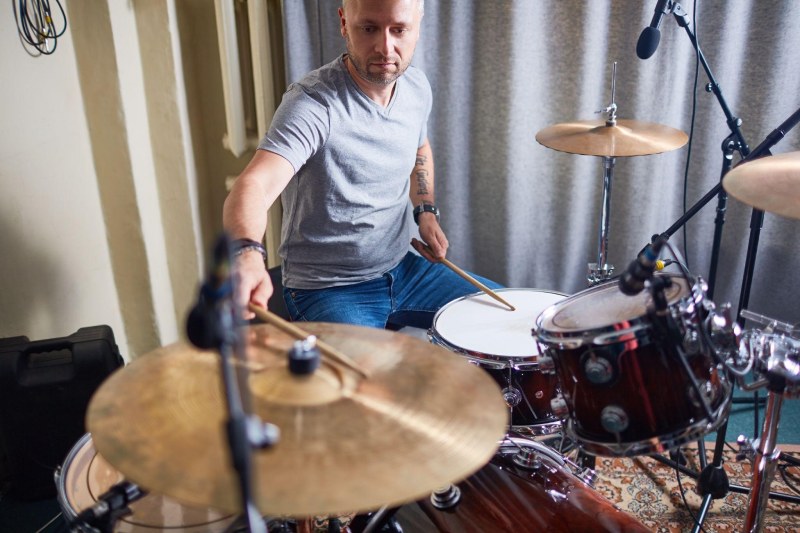Health
Scott Stotelmyer Discussed Mental Health and Self-Care for Musicians: Nurturing Your Well-being in a Demanding Industry

Musicians need to take care of their mental health in the demanding world of the music industry. Scott Stotelmyer, a pro in this field, shares helpful tips for nurturing well-being.
Practicing and performing can be stressful and exhausting. It can cause burnout and other mental issues. Therefore, musicians must focus on their mental health and take proactive steps.
Stotelmyer suggests a few strategies. Musicians should create a routine that includes regular breaks, restful sleep, and exercise. Doing activities outside of music can be a great escape.
Boundaries should be set, and expectations managed. Realistic goals should be made, and saying no can help reduce stress. Also, seeking support and openly communicating with family and friends offers emotional reassurance.
Mindfulness and relaxation techniques like meditation or deep breathing can also help. These practices manage stress levels and help find inner calm.
Self-care allows musicians to improve their well-being, creativity, and performance. Cultivating a healthy mind lets them emotionally connect with themselves and the audience.
Understanding the Demands of the Music Industry
The music industry has a reputation for being tough. Musicians must be creative, productive, and perform well. Long hours, intense competition, and the need to make hit songs can impact mental health.
Passion and commitment to dreams are essential, but it’s crucial to understand the effects the industry has. Hours of practice, performance, and the need to prove yourself can lead to burnout, anxiety, and depression.
Musicians must prioritize self-care. Relaxation and rejuvenation are essential. Healthy boundaries and support are also needed. Meditation, yoga, exercise, and nutrition can reduce stress and promote clarity.
Connecting with other musicians can help. Sharing challenges and strategies can build community. Collaborating on projects or workshops fosters creativity.
Remember: seeking professional help is not a sign of weakness but a proactive step to look after mental health. A therapist or counselor familiar with musicians can provide insights into stress management, creative blocks, and career transitions.
The Impact of the Music Industry on Mental Health
The music industry can have a massive impact on musicians’ mental health. It’s stressful and demanding, so artists often experience mental health problems. Producing music, performing, and keeping up an image is challenging.
Musicians usually have long shifts, weird schedules, and travel a lot. This messes with their sleep and leads to exhaustion. It can cause anxiety, depression, and even burnout. Plus, the competitive nature of the industry is stressful and self-doubting.
Also, the media and fans judge their performances. It’s emotionally draining to have to worry about negative criticism. To cope, musicians focus on self-care. Exercising, therapy, connecting with people, and having hobbies can help them manage stress and stay well.
The music industry may be challenging, but mental health has to come first. Self-care allows artists to create music and look after themselves. Scott Stotelmyer‘s story of his struggles highlighted the need for support and self-care in the music industry.
Strategies for Nurturing Mental Health and Self-Care
Prioritize rest! Busy schedules can be tricky, but rest and sleep are key. They recharge the body and mind, reducing stress and improving well-being.
Establish boundaries. Be able to say no to commitments that may be too much. This will give you the freedom and space to care for yourself.
Practice mindfulness. Incorporate activities like meditation and deep breathing into your daily routine. This will help reduce anxiety, improve focus, and promote calmness.
Engage in physical activities. Exercise has physical and mental benefits. It releases endorphins which make us feel good and reduce stress. Find something you enjoy and do it regularly, like dancing, yoga, or running.
Seek support. Feel free to reach out to people who can guide you in difficult times.
Nurturing mental health is about understanding your emotional needs and being aware of your stress triggers.
Scott Stotelmyer, a renowned musician, faced burnout early in his career due to neglecting mental health and self-care. This experience prompted him to explore ways to manage his well-being while pursuing his passion.
The Importance of Boundaries and Saying No
Boundaries and saying no are musts for mental health and well-being in the music industry. Pressure to perform and meet expectations can be hard on mental and emotional health.
Boundaries set limits on time, energy, and personal space. They help prioritize well-being by saying no to overwhelming or harmful situations. Setting boundaries protects resources for rest, relaxation, and self-care.
Saying no can be challenging, fearing missed opportunities or letdowns. But it’s vital for balance and preventing burnout. Saying no respectfully and assertively allows needs to be met without guilt or shame.
Boundaries and saying no also aid personal and professional relationships. They create a healthy dynamic where limits are respected, and value is given.
Building Resilience and Coping Mechanisms
Building resilience & coping mechanisms is essential for musicians to navigate the music industry successfully. Strategies to bounce back from setbacks & manage stress must be developed.
A robust support system is vital. Those who understand the challenges & provide emotional help should be surrounded by musicians, friends, family, or mental health professionals.
Self-care activities are crucial for maintaining resilience. Regular exercise, sleep, mindfulness/meditation, & hobbies outside of music should be prioritized.
Realistic goals & managing expectations are also helpful. The music industry can be unpredictable. Attainable goals & a positive mindset will help handle rejection & stagnation.
Time management skills can contribute to resilience. Busy schedules & tight deadlines must be managed & prioritized to reduce stress & prevent burnout.
In conclusion, building resilience & coping mechanisms are essential for musicians. By cultivating support, practicing self-care, setting realistic goals & managing time, musicians can thrive.
Balancing Physical Health and Mental Well-being
Balancing physical health and mental well-being is crucial for musicians. The pressures, long hours, and irregular lifestyles can take a toll. So, self-care is essential.
Exercise helps keep the body fit and releases endorphins. Setting up a routine can improve stamina and reduce stress.
Adequate rest and sleep are also vital. Irregular schedules can make this easier. But, creating a conducive sleep environment and sticking to a regular cycle can be helpful.
Mindfulness practices can reduce anxiety. Taking breaks to practice them can provide mental rejuvenation.
Maintaining a healthy diet is vital too. Eating fruits, veggies, whole grains, and lean proteins and staying hydrated promote wellness. Avoid caffeine and alcohol, as they can disrupt sleep and aggravate stress.
Self-care is vital for musicians to balance physical health and mental well-being. Incorporating these suggestions into their lifestyle helps create equilibrium.
Creating a Positive and Supportive Environment
Creating a positive environment is essential to support musicians’ mental health and well-being. Here are 4 key points to ponder:
- Allowing musicians to share their thoughts, feelings, and concerns can build a supportive atmosphere. This way, issues can be identified and solutions sought together.
- Offering musicians the chance to work together develops a spirit of camaraderie and support. It increases creativity and provides emotional backup during the highs and lows of the music industry.
- Criticism that’s constructive helps musicians progress, but it should be put forward respectfully. By offering feedback on how to improve rather than criticizing, musicians feel supported in their artistic development.
- Treating everyone in the music industry respectfully is fundamental to creating a positive environment. This includes recognizing diversity, valuing individual strengths, and appreciating everybody’s input into the music-making process.
Moreover, it is crucial to urge self-care like setting boundaries, resting when necessary, seeking professional help, and endorsing healthy lifestyle habits.
Scott Stotelmyer, an expert in musicians’ well-being, has noted that fostering a positive and supportive environment can significantly improve mental health outcomes for musicians.
Encouragement for Musicians to Prioritize Self-Care
In the tough music biz, self-care is key for mental health. Taking care of oneself allows artists to tackle industry challenges.
A musician’s life includes long practice and performance hours, which can affect their physical and mental health. Musicians must set aside time for self-care activities like meditation, exercise, or hobbies. Incorporating these into their routine helps create balance and supports their mental health.
Seeking support from family, friends, or fellow musicians can provide emotional support. A support system reduces stress and gives a platform for sharing industry woes. Through these connections, musicians find encouragement and solace.
Self-care also includes setting boundaries. While musicians must work hard, it’s essential to avoid burnout. They should recognize when they need rest and create healthy boundaries between work and personal life. This could mean regular breaks or specific times solely for relaxation.
Finally, a healthy lifestyle is crucial. Musicians should prioritize sleep, proper nutrition, and staying hydrated. Sleep helps the body recover, while food fuels performance energy levels. Hydration aids cognitive function and vocal health.
-

 Business4 weeks ago
Business4 weeks agoBudget-friendly Strategies for Market Research When Starting a Business
-

 Business4 weeks ago
Business4 weeks agoSignificance of Small Business Saturday, an Annual Shopping Holiday
-

 Education3 weeks ago
Education3 weeks agoSwiss International University Acquires Four Prestigious Academies in Switzerland, Dubai, and Kyrgyzstan for $21.7 Million
-

 Startup2 weeks ago
Startup2 weeks agoAdam Strobel: Navigating the Shift from Tech Start-Up to Industry Leader
-

 Business3 weeks ago
Business3 weeks agoHow Efficiency is Key to a Small Business’s Customer Service Platform
-

 Business4 weeks ago
Business4 weeks agoSuccessful Small Business Marketing Strategies to Market Your Brand
-

 Tech1 week ago
Tech1 week agoAmazon is Expanding Its Strategic Partnership with Intuit by Providing Its Millions of Third-party Sellers with Intuit QuickBooks Software
-

 Health1 day ago
Health1 day agoFrom Hair Loss to Hair Restoration: How Men Are Tackling Balding in 2025

























